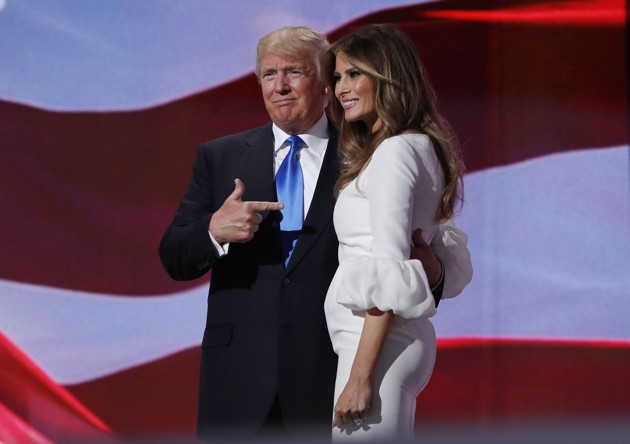
This is a further spelled-out version of what I was trying to say Tweet-storm style a little while ago.
Political process stories usually matter more to the politically obsessed tribe of reporters and operators than to anyone else.
But the recurring series of mis-steps by Team Trump in the weeks since their candidate clinched the GOP nomination, culminating in last night’s plagiarism episode, potentially matter in a broader way. Here’s why, in the simplest bullet-point form I can muster:
- This is not about Melania Trump herself. She did a creditable job in challenging circumstances. The only thing she did wrong on the speech was to (foolishly) tell Matt Lauer of Today that she had written it herself. No sane person would expect her to have done so. It’s her bad luck that what would normally be a routine white-lie turns out to be immediately and consequentially untrue, as in some sitcom nightmare.
- In the world of national-level politics, what just happened is a really big mistake. Joe Biden’s famous “repurposing” of Neil Kinnock’s childhood story came during campaign speeches, not a formal convention address. (And remember, publicity about the episode played a big part in driving Biden out of the 1988 presidential race.) You just don’t do things like this if you’re a competent political organization — and if someone does it and gets caught, that person takes the blame, presumably by being fired.
If Trump ends up not firing anyone, the possibilities would seem to be: Maybe he’s not tough enough to discipline his own? (But really? For the man whose trademark phrase was “You’re fired!”?) Or maybe the author is someone he can’t fire, such as the most writing-connected member of his inner circle, his son-in-law Jared Kushner? Or maybe he’ll pretend this didn’t happen or is not an error? That just lets things fester, as opposed to resolving the story as quickly as possible — which is what anyone with actual experience in politics would have tried to do.
- This is one of a series of things competent political organizations don’t do. You don’t have the candidate call into a live TV interview show while someone else is giving a major televised convention speech on the candidate’s behalf (as Trump did last night). You don’t turn the big unveiling of a vice-presidential pick into a rambling off-topic riff, as Trump did with Mike Pence last week. You don’t announce speakers for your convention without first checking whether they want to appear, as the Trump team apparently did with Tim Tebow. You don’t deliberately or thoughtlessly piss off your own party’s governor of the perennially most important swing state, as Trump has done with John Kasich of Ohio.
- These are not the “rules” of politics in some crusty, due-to-be-overthrown sense. They are signs of basic operational competence. There is absolutely nothing to be gained by a plagiarism controversy, or a spat with the host-state governor, or a Tebow-type flap. These are the equivalent of not getting your permits before breaking ground on a building, or of screwing up the plumbing plans.
- It is manifestly possible to win a primary election campaign despite throwing out the rulebook and running a communications strategy based on TV interviews and Twitter. We know it’s possible because Donald Trump has just done it.
- It is conceivable that the same operating strategy — one guy and his family and his friends, operating on his gut — will also work in a general election. But it’s not obvious that it can or will. Running a nationwide campaign is much, much harder than the intra-party process Trump has just been through. And based on the evidence of the past few weeks, Trump and his team have consistently stubbed their toes and made rookie errors each time they face a new challenge. The flap over Melania’s speech, for which someone should have been fired by now, is just the latest illustration.
- Just to be clear about it, moves like these don’t represent “a fresh approach” or “shaking things up” or “being authentic.” They represent incompetence.
- Now, why this should matter to people other than the insiders. If managing a general-election campaign is, say, 10 times more complex than running in the primaries, actually serving as president is roughly one million times harder than that. (Won’t go into the reasons now, but some of them are here, and others three decades earlier here.)
- In short: success as a campaigner obviously does not guarantee success as a president. Robert Redford’s final words in the McGovern-era film The Candidate are one of many reminders. But if you can’t even handle the complexities of running your own party’s convention, how on Earth can you begin to juggle the complexities of the entire Federal budget; and dealings with the Congress; and the foreign crises that crop up each day; and filling the thousands of politically appointed positions in the executive branch; and right on down an endless list.
***
You can ignore most “process” stories if you’re not a politically interested person. But these are process stories that cumulatively matter. If a potential commander- in-chief is repeatedly wrong-footed by the challenges of a week in Cleveland, God save us if you try to deal with the whole government.
***
Update: David Frum has now weighed in with a complementary set of reasons the speech is more than a passing flap.